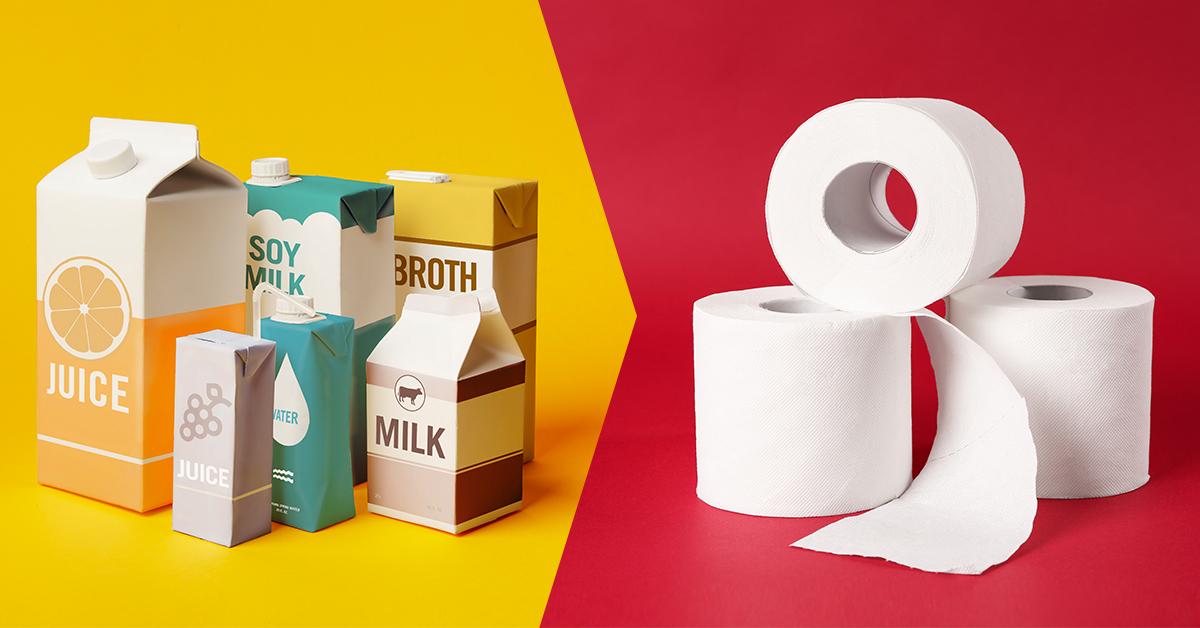Recycled Cartons Can Help Prevent Paper Product Shortages
Carton Council launches new awareness campaign

Recycled cartons can help prevent paper product shortages
RECYCLED CARTONS CAN HELP PREVENT TOILET PAPER SHORTAGES: CARTON COUNCIL LAUNCHES NEW AWARENESS CAMPAIGN
DENTON, Texas, June 25, 2020 /3BL Media/ – With some recycling programs across the country having to scale back services or halt collection completely as a result of the COVID-19 pandemic, recyclers are in a challenging situation trying to find the feedstock needed to keep up with an increase in demand for certain paper products.
On the other hand, these paper products, like toilet paper, tissues, and paper towels, have been flying off the shelves, and many manufacturers are struggling to keep up. Food and beverage cartons, made mainly of paper, are an example of a recyclable material that provides the needed feedstock for paper mills to create new products. In response, the Carton Council has launched a new campaign alerting consumers of the valuable role cartons play in funneling a steady stream of recycled paper to recyclers and manufacturers in this time of need.
“First and foremost, we are thankful to all in the industry who are working hard to help keep the recycling supply chain operating during these challenging times,” said Jason Pelz, Vice President of Recycling Projects for the Carton Council of North America. “We’ve heard from numerous people about the increase in demand for feedstock, especially fiber, and want to encourage mills to consider materials like food and beverage cartons that can be recycled to make many of these paper products.”
“Recycled food and beverage cartons continue to be a very important source of paper fiber for our mills,” said Michele Bartolini, Senior Marketing Director for Sustana. “People are consuming a larger quantity of paper products in their homes right now, like toilet paper, tissues, and paper towels, as well as food and beverage products. It is important for consumers to recycle their food and beverage cartons because the fibers in cartons are clean and of excellent quality to be used to produce the pulp needed to manufacture those essential items. Cartons miss the opportunity at a second life if they are sent to landfill. Recycling your cartons is a small act that can have a big impact!”
“Recycling programs are extremely important for our facility. We use 100% recycled raw material to the tune of over 2,100 tons per month, with over half of that being directly from post-consumer recycling operations across the U.S. and Canada,” said Tori Beckett, Vice President at Great Lakes Tissue. “With all the toilet paper shortages across the country, our operations are still at maximum-capacity production and need all of the cartons we can get our hands on. We only keep a couple of weeks’ supply on hand and if the collections stop, we do fear we will not be able to keep a sustainable operation running.”
Despite the widespread shortages and attention they received, new research from the Carton Council reveals that most consumers fail to make the connection between their recycling of paper at home and its value in providing feedstock to help make new paper products. When asked how much impact recycling at home has on helping with paper shortages, 33% of consumers reported they thought recycling might have some impact on helping with the shortages, but they weren’t sure how much it really helped. While 18% felt recycling had no impact at all on alleviating shortages, 13% were unsure and had not thought about the connection.
The Carton Council campaign will reach consumers and sustainability professionals with a steady stream of information across digital platforms, including Facebook, Instagram, Twitter and YouTube, to encourage them to #RecycleYourCartons and explain how cartons make the transformation into in demand paper products like toilet paper.
“Our world is in an unprecedented situation, yet we are seeing that recycling is more important than ever,” said Pelz. “We hope that everyone, consumers and businesses alike, continues to see that recycling helps ensure the recycling supply chain keeps functioning, benefiting the environment and the economy all at once,” said Pelz.
Please contact Angela Peterson at Angela.Peterson@tetrapak.com if you’d like to contribute to this campaign and share this timely message with your consumers.
Jason Pelz serves as both the Vice President of Recycling Projects for the Carton Council of North America as well as the Vice President of Sustainability – Americas for Tetra Pak.
ABOUT THE CARTON COUNCIL
The Carton Council is composed of four leading carton manufacturers, Elopak, Evergreen Packaging, SIG Combibloc, and Tetra Pak. Formed in 2009, the Carton Council works to deliver long-term collaborative solutions in order to divert valuable cartons from the landfill. Through a united effort, the Carton Council is committed to building a sustainable infrastructure for carton recycling nationwide and works toward their continual goal of adding access to carton recycling throughout the U.S. For more information, visit CartonOpportunities.org.
###

